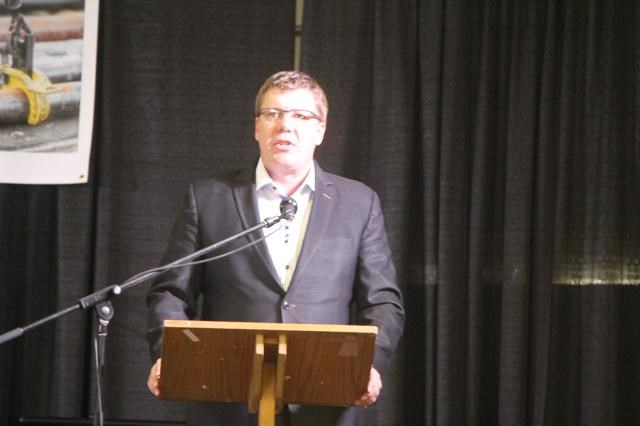By Greg Nikkel
Two cabinet ministers, including Energy and Resources Minister Dustin Duncan and Environment Minister Scott Moe, both promised representatives of the oil industry that they will fight the carbon tax if it is imposed by the federal government.
The two ministers were keynote speakers at the Saskatchewan Oil and Gas Show on Wednesday, with Moe speaking at the noon luncheon for the Saskatchewan Oilpatch Awards ceremony, and Duncan spoke in the evening when the southeast Sask. awards were presented. Premier Brad Wall was a no-show after initially indicating that he was going to tour the show on Wednesday afternoon, but cancelled at the last minute.
In addressing the attendees of the Oil Show at noon, Moe said the provincial government is part of the combined efforts to reduce greenhouse emissions in Canada, and pointed out Saskatchewan only produces about 10 per cent of the emissions in Canada, while this province’s Gross Domestic Product rose 23 per cent due in large part to the activity of the oil industry.
If the Trudeau government moves to impose the carbon tax on Saskatchewan, as they have threatened to do, Moe said this would be a major impact on the province’s economy of at least $750 million.
“We worked hard to increase the GDP by 23 per cent, and we worked hard with the industry to create the Saskatchewan advantage, and we have no intention to reduce that,” said Moe, noting it appears the carbon tax may be imposed by 2018.
“We will continue to work on your behalf in the province of Saskatchewan. This federally-imposed carbon tax would be the biggest tax this province has ever experienced,” he said, pointing out this will would create a less competitive environment for industries like oil and gas.
He noted one only has to look south into the United States to see how the industry would be put at a severe disadvantage.
“Some producers are already changing their assets in the Canadian market. The last number of years have been challenging in this industry. We feel that, and you feel that a great deal more,” said Moe, noting that most oil producers would not be able to pass on their additional cost to their customers in the event of a federally-imposed carbon tax.
He also pointed out that President Donald Trump has made it quite clear that he will not impose any kind of carbon tax, as he has promised the U.S. will withdraw from the Paris Accord on the environment, one of the only countries in the world to do so. Thus, it will be important to Saskatchewan not only to reduce greenhouse emissions, but to do it in an economically-sound way.
“We will do everything in our power to mitigate the impact of this carbon tax on Saskatchewan jobs, Saskatchewan families and Saskatchewan communities. If this means we end up in court to fight this tax, so be it,” said Moe.
Meantime, the province is continuing to move towards reducing its impact on the environment, as Moe pointed out that 25 per cent of the province’s power comes from renewable energy sources, and this province is a world-leader in carbon capture technology, such as the CCS project at the Boundary Dam, which has sequestered 1.5 million tonnes of carbon dioxide.
In his speech to the Oil Show, Duncan pointed out that to be the MLA for Weyburn-Big Muddy and to be the Energy minister at the Oil Show was a tremendous honour for him, as he had been attending the show since he was very young, and knew the local oil industry names like Jerry Mainil, Dempsey Laird, Pierre Mondor and Ken Cugnet.
“We have a story to tell in this province of the opportunities and challenges facing this industry,” he said, noting that drilling of oil wells is double that of a year ago so far.
“Some of the best oil plays on the continent are yet to be explored and developed,” said Duncan, who pointed out the biggest need for the industry right now is for pipelines to be built to enable the moving of crude oil to where it can be shipped to markets.
In relation to the proposed carbon tax by the federal government, Duncan pointed out the way the tax will be applied is highly unfair and inconsistent to how manufacturers in Ontario and Quebec are treated. The proposal is for the tax to apply not only to producers, but to the consumers as well, which is not done for any product that is manufactured in Eastern Canada.
He said the carbon tax smacks of the National Energy Program, which devastated the oil industry, and promised the oil company owners and employees listening that “we will take the fight to court on behalf of the province,” earning him loud applause from the audience.




